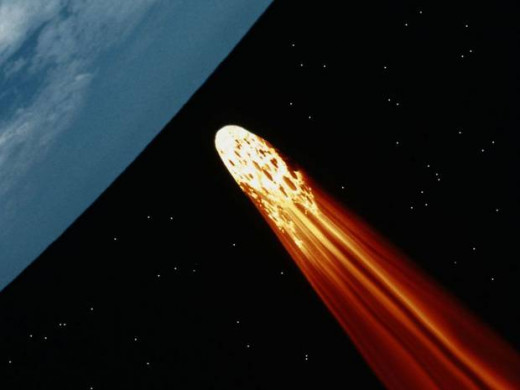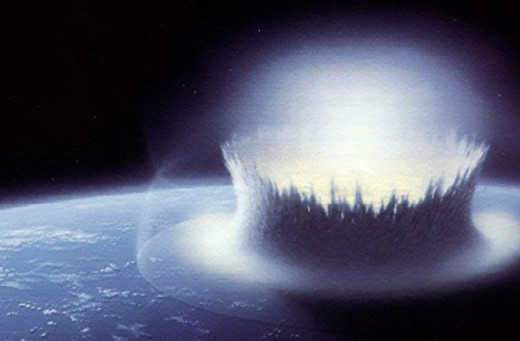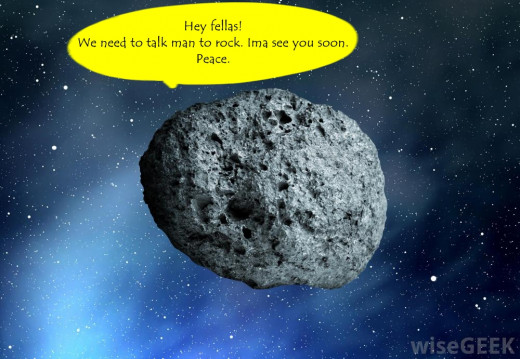Mind Blowing Facts they never taught you in school - Part 4 (Asteroids)
Today's topic, Asteroids!
I had discussed a little bit about asteroids in Part 2, but somehow I think that that nearly wasn't enough. There's still a lot to talk about.
Let's do a quick revision first:
- Asteroids are big ass rocks floating in space.
- They are known to undergo bouts of sudden PMS, and fling off their own orbits and start bolting towards the Earth's orbit at speeds of sixty six thousand miles per hour.
- An asteroid the size of a house, could annihilate a whole city. Don't judge her though, it's that time of the.. the... *cough* It's that time again.
- Steven Ostro of Jet Propulsion Laboratory had said:
“Suppose that there was a button you could push and you could light up all the Earth-crossing asteroids larger than about ten meters, there would be over 100 million(100000000) of these objects in the sky, all of which are capable of colliding with the Earth and all of which are moving on slightly different courses through the sky at different rates. It would be deeply unnerving.”

Rattled? No? Alright, some more.
- An asteroid flew past us in 1991, missing earth by a distance of 106,000 miles.
- Another one in 1993 missed us by 90,000 miles. This may sound like a lot to you but in cosmic terms, it is the equivalent of a bullet tearing through one's sleeve missing the arm by a whisker.
- Such near misses are believed to happen twice or maybe thrice every week.
- One cannot warn an asteroid impact simply because it won't be caught. The ones I mentioned were noticed after they had sped past. A hundred yard long object charging towards earth wouldn't be caught by a telescope until it was only a few days away. And that too, only if a telescope somehow happened to be trained on it. Which is highly unlikely as "the number of people in the world who are actively searching for asteroids is a little higher than a typical McDonald's restaurant staff."
- To the naked eye, an asteroid will not be visible until it stabbed the atmosphere, which will be about a second before it hit the earth.

The impact. WARNING! Not for the faint hearted.
Now let us discuss a case of an actual hit.
A lot depends on the trajectory, angle and mass of the asteroid, but here's a likely scenario of what would happen if an asteroid fell on earth right now.

It would be headed in our direction at tremendous speed, ten times the speed of the fastest bullet made by man. It will be so damn fast that when it ruptures the atmosphere, it won't cut past air to make way, it will compress it. The air beneath it will be unable to give way to the humongous piece of rock and get compressed. The result, within nanoseconds it will be ten times as hot as the surface temperature of the Sun. Houses, cars, trees, everything in the rock's path would scorch, blacken and vanish like cellophane.
A second later, it would bang on the surface of the earth, vaporising and disappearing instantly. But the explosion would blow out a thousand cubic kilometres of rock and superheated gases killing every single living organism within a hundred and fifty mile radius. The initial shock wave would then extend outwards at a velocity not much lesser than the speed of light. The people that are just beyond the area of impact would now observe spellbound a dazzling flash of blinding light, the brightest they'd ever seen, followed by a catastrophic sight of indescribable majesty- an apocalyptic wall of darkness filling the entire field of view and reaching into the clouds approaching at several thousand kilometres per hour. The most blood curdling thing is, it will all be petrifyingly silent; the approaching wall of debris will be travelling way beyond the speed of sound.
Anyone looking in the right direction would see a mysterious veil of turbulence followed by immediate sleep. Forever.
Within minutes, everything standing within an area of a little less than thousand miles will be devoured by blackness and flattened, sliced, carved by a storm of flying projectiles.
The havoc will gradually diminish beyond a thousand miles, but that is just the initial shockwave. The impact will most definitely set off a series of destructing earthquakes all across the planet. Volcanoes would erupt, tsunamis would rise, within an hour, menacing black clouds would encompass the globe, the earth will be pelted by burning rock and debris setting most of it ablaze. Estimations say, at least more than a billion people will be dead within the first 24 hours. Death numbers will hardly be affected by any sort of relocation effort. There'd be nowhere to run, you cannot outrun your planet.
Ash and soot would blot out the sun for months, perhaps years destroying all kinds of growing cycles. Earth's ability to support life would diminish, significantly.
And all this will come without any warning.
And what if a fortunate telescope catches it on it's way? Action movies have led us on to believe that we could blast the meteor to kingdom come. Only, there are a couple problems.
a) Our missiles don't carry enough power to leave the atmosphere
b) Even if we did manage to blast it into pieces, most of them are still going to slam into the planet, causing a smaller percentage of the devastation explained above, in various countries instead of one.
Having fun yet? There's more where this came from. Until next time.

For more amazement!
- Mind Blowing Facts they never taught you in school - Part 6 (Microbes)
World of the terribly tiny. Let's dive in. - Mind Blowing Facts they never taught you in school- Part 5 (Water)
One of the most important elements of the Earth, crucial for our survival. Water. Or as the British call it, wotah. - Mind Blowing Facts they never taught you in school - Part 3 (Atom)
Subatomic particles. Atoms, protons, neutrons, electrons. Crazy facts. - Mind Blowing Facts they never taught you in school - Part 2 (Solar System)
Continuation of the list of fascinating facts. An effort to expand one's knowledge of the planet and the universe to a great extent and make them a hit in Sunday brunch and tea parties. - Mind Blowing Facts they never taught you in school - Part 1 (Universe)
Prepare to be mind#ucked. Space Facts. Earth Facts. There's thousands of facts like this that you've probably forgotten or never knew. Sit back and enjoy. This is just the beginning.



